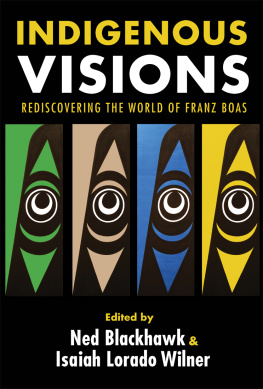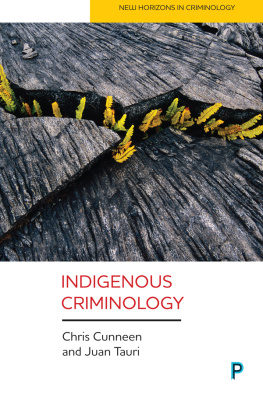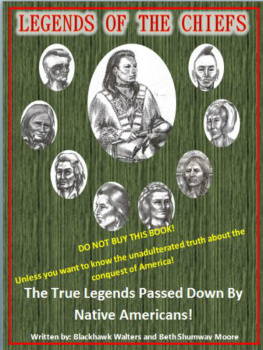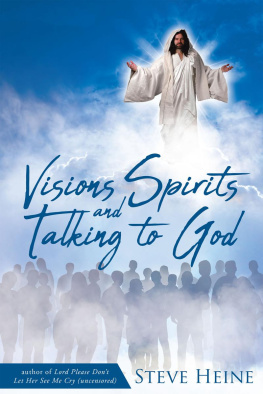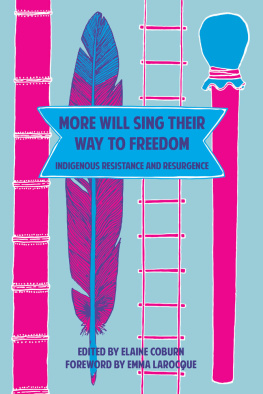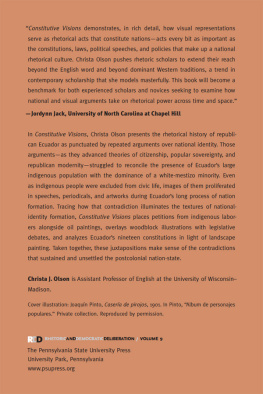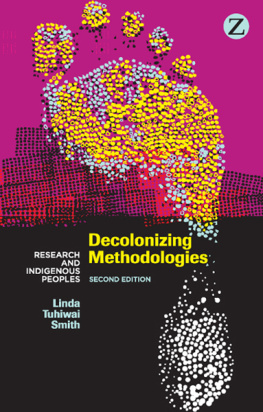Ned Blackhawk - Indigenous Visions
Here you can read online Ned Blackhawk - Indigenous Visions full text of the book (entire story) in english for free. Download pdf and epub, get meaning, cover and reviews about this ebook. publisher: Yale University Press, genre: Politics. Description of the work, (preface) as well as reviews are available. Best literature library LitArk.com created for fans of good reading and offers a wide selection of genres:
Romance novel
Science fiction
Adventure
Detective
Science
History
Home and family
Prose
Art
Politics
Computer
Non-fiction
Religion
Business
Children
Humor
Choose a favorite category and find really read worthwhile books. Enjoy immersion in the world of imagination, feel the emotions of the characters or learn something new for yourself, make an fascinating discovery.
- Book:Indigenous Visions
- Author:
- Publisher:Yale University Press
- Genre:
- Rating:3 / 5
- Favourites:Add to favourites
- Your mark:
- 60
- 1
- 2
- 3
- 4
- 5
Indigenous Visions: summary, description and annotation
We offer to read an annotation, description, summary or preface (depends on what the author of the book "Indigenous Visions" wrote himself). If you haven't found the necessary information about the book — write in the comments, we will try to find it.
Indigenous Visions — read online for free the complete book (whole text) full work
Below is the text of the book, divided by pages. System saving the place of the last page read, allows you to conveniently read the book "Indigenous Visions" online for free, without having to search again every time where you left off. Put a bookmark, and you can go to the page where you finished reading at any time.
Font size:
Interval:
Bookmark:
Indigenous Visions
The Henry Roe Cloud Series on American Indians and Modernity
Series Editors
Ned Blackhawk, Professor of History and American Studies, Yale University
Kate W. Shanley, Native American Studies, University of Montana
Named in honor of the pioneering Winnebago educational reformer and first known American Indian graduate of Yale College, Henry Roe Cloud (Class of 1910), this series showcases emergent and leading scholarship in the field of American Indian Studies. The series draws upon multiple disciplinary perspectives and organizes them around the place of Native Americans within the development of American and European modernity, emphasizing the shared, relational ties between Indigenous and Euro-American societies. It seeks to broaden current historic, literary, and cultural approaches to American Studies by foregrounding the fraught but generative sites of inquiry provided by the study of Indigenous communities.

Published with assistance from the income of the Frederick John Kingsbury Memorial Fund.
Parts of originally appeared in Benjamin Balthaser, Travels of an American Indian into the Hinterlands of Soviet Russia: Rethinking Indigenous Modernity and the Popular Front in the Work of Archie Phinney and DArcy McNickle, American Quarterly 66, no. 2 (2014): 385416, and Benjamin Balthaser, Anti-Imperialist Modernism: Race and Transnational Radical Culture from the Great Depression to the Cold War (Ann Arbor: University of Michigan Press, 2016).
Copyright 2018 by Yale University.
All rights reserved.
This book may not be reproduced, in whole or in part, including illustrations, in any form (beyond that copying permitted by Sections 107 and 108 of the U.S. Copyright Law and except by reviewers for the public press), without written permission from the publishers.
Yale University Press books may be purchased in quantity for educational, business, or promotional use. For information, please e-mail (U.K. office).
Set in Adobe Garamond type by IDS Infotech, Ltd.
Printed in the United States of America.
Library of Congress Control Number: 2017944783
ISBN 978-0-300-19651-1 (paperback : alk. paper)
A catalogue record for this book is available from the British Library.
This paper meets the requirements of ANSI/NISO Z39.48-1992 (Permanence of Paper).
10 9 8 7 6 5 4 3 2 1
Contents
Acknowledgments
This book began with an interdisciplinary conference held at Yale on September 1517, 2011, in commemoration of the centennial of Franz Boass treatise on the dynamism and diversity of modern belonging, The Mind of Primitive Man. We wish to thank our sponsors at the Howard R. Lamar Center for the Study of Frontiers and Borders, John Mack Faragher, Jay Gitlin, and Edith Rotkopf, and our cosponsors at the Gilder Lehrman Center for the Study of Slavery, Resistance, and Abolition, David Blight, Dana Schaffer, and Thomas Thurston. Two members of Yales faculty, Glenda Gilmore and William W. Kelly, played instrumental roles in planning the meeting.
Stephen Pitti and Alicia Schmidt Camacho hosted the memorable dinner at Ezra Stiles College where much of the conversation that inspired this book began. We also benefited from the involvement of the Beinecke Rare Book and Manuscript Library, particularly that of the curator of Western Americana, George Miles, and the special interest taken by Harvey Goldblatt of Pierson College and Mary Miller, the dean of Yale College at the time.
Several of Yales interdisciplinary centers and programs provided much-needed support. We thank the program in Ethnicity, Race, and Migration; the MacMillan Center for International and Area Studies; the Committee on Canadian Studies; the European Studies Council; the Council on Latin American and Iberian Studies; and the Center for Comparative Research. We thank the departments of History, English, Anthropology, and African American Studies for their financial and intellectual involvement. The Edward J. and Dorothy Clarke Kempf Memorial Fund and the Stanley T. Woodward Lectureship made it possible for us to invite international speakers, and for these investments we would like to thank the Office of the Provost and the Office of the Secretary.
A few scholars have played critical roles in the conversation that created this book. We thank Elizabeth Alexander, Taiaiake Alfred, Elijah Anderson, Seyla Benhabib, Jonathan Holloway, Matthew Jacobson, J. Khaulani Kauanui, Kerwin Lee Klein, Joshua L. Reid, and Michael Warner for discussions of race, indigeneity, migration, and modernity that contributed directly to the development of the project. Our thinking about the global circulation of knowledge benefited from exchanges with Sebastian Conrad, Joanna Radin, and James C. Scott. Finally, our editors at Yale University Press, Christopher Rogers, Adina Popescu Berk, and Erica Hanson, helped bring the book to fruition.
Introduction
Few Western thinkers have engaged with Indigenous people more closely or reaped greater rewards from that engagement than Franz Boas, the founder of modern anthropology. In the early twentieth century, as the worlds self-declared advanced nations competed to colonize the globe and exploit its natural resources, Boas drew upon what he had learned among Native peoples to present an alternative approach to modernity. Questioning the assumption that the West could claim the prerogative to rule the rest by right of natural endowment, Boas critiqued the idea of race, the master concept of colonialism. He shaped the modern notion of culture as an interactive process to which each of the worlds peoples has contributed its portion of knowledge. And he framed the idea of grammar as a universal characteristic of human cognition, the borderless ability to structure linguistic meaning. These interrelated concepts interrogated the standards by which the world measured progress, ultimately projecting visions of a shared global community.
Today Boas is beginning to undergo a reevaluation.
Yet, in comparison to Boass wide reception, little attention has been paid to the vast network of Indigenous collaborators upon whom he relied. This anthology considers their influence, revealing the underrecognized centrality of Native peoples and other peoples treated as subjects of scientific study in the making of the Boasian tradition. Through their interactive relationships established with Boas and other anthropologists, Indigenous peoples transmitted insights that have extended beyond national communities, germinating developments from history to linguistics, literary studies, philosophy, and social theory. To take just one of many possible examples, after the Second World War Kwakw a k a wakw concepts of reciprocity, first expressed to Boas decades earlier in British Columbia, contributed to a new rhetoric of decolonization and anticapitalist critique. Ranging from the work of Marcel Mauss to that of Guy Debord, ideas about gift economies and communal redistribution became centrally lodged in Continental philosophical debates about the meanings of value and language as well as expression. These ideas became so ubiquitous that Parisian activists in the events of 1968 looked to a journal named Potlatch, a nod to Northwest Coast Native cultural and ceremonial practices. The idea of the gift was only one of many ways in which Indigenous peoples helped to redirect the currents of Western metaphysics, drawing upon their own cultural values and their experiences under colonial rule.
The centerpiece of this trifecta was The Mind of Primitive Man, a book of essays drawn in large part from Boass study of Native societies. The book takes the form of a thought experiment that attempts to disassemble the confining features of Western thought and read the diversity beyond it. While the very colonizing outlook that the book attempts to critique stands today in its title, its contents helped to inaugurate a century of cultural inquiry. More than any of Boass works, this title encapsulates the opportunities as well as the limitations inherent in the transcultural study of diversity, identity, and belonging.
Next pageFont size:
Interval:
Bookmark:
Similar books «Indigenous Visions»
Look at similar books to Indigenous Visions. We have selected literature similar in name and meaning in the hope of providing readers with more options to find new, interesting, not yet read works.
Discussion, reviews of the book Indigenous Visions and just readers' own opinions. Leave your comments, write what you think about the work, its meaning or the main characters. Specify what exactly you liked and what you didn't like, and why you think so.

